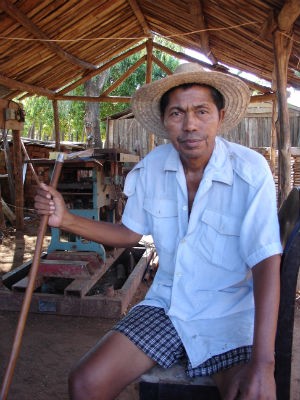
Feroce - ferocious in French, and he carries his name well - wears a thin blue shirt and sits in the shade to direct his four workers with wide swipes of his wooden cane. His workers are assembling plows and pumps, welding metal together. He has to speak loudly to cover the rat-rat-tat of his generator, isolated in a clean, cool hut at the edge of his large courtyard, packed with green foot pumps and ploughs. Feroce's workshop is the only house with electricity for miles.
"I run a business that makes money, I support half a dozen workers, and I supply villages with pumps and water," Feroce explains. "What could be better?"
Through a USAID-funded program, CARE International installed reliable and hardy foot pumps in villages scattered throughout Amboasary and Ambovombe districts, in Madagascar. As part of the project, experts trained Feroce on how to build, sell and maintain these high-quality pumps. His business has grown so swiftly that he works fulltime for his workshop.
A new pump costs 250,000 ariary (about $120), and most customers are farmers' groups and villages that have pooled their finances. "I am happy to accept payment in several installments […]" says Feroce. "It's normal. Everybody needs credit around here."
The 20 or so pumps the workshop turns out each month are saving lives. In the arid southern regions of Madagascar, obtaining water is a full-time job. Those who do not have access to pumps are forced to purchase water from dirty, donkey-drawn carts at high prices; and if they cannot afford it, women must walk hours each day with backbreaking loads to carry the water long distances back to their homes. Families purchase the absolute minimum amount and use it sparingly. The water is generally contaminated and can lead to diarrhea - the second highest cause of death among infants.
“We started with foot pumps, and now we also supply ploughs for the fields,” Feroce explains. "A new pump is only as efficient as its parts - if it breaks down and there's no spare parts, or anyone to fix it, then it was only as good as the six weeks or six months that it ever lasted for in the first place," said Feroce. "But my workshop is here to stay."







Comment
Make a general inquiry or suggest an improvement.